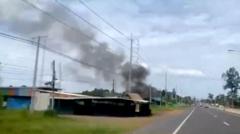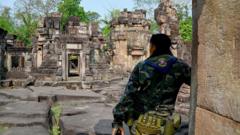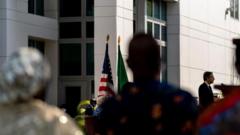The latest clashes at the Thailand-Cambodia border signal a worrying escalation in hostilities, exacerbated by a personal fallout between political leaders.
Turbulent Ties: The Eruption of Conflict at the Thailand-Cambodia Border

Turbulent Ties: The Eruption of Conflict at the Thailand-Cambodia Border
A historical analysis of the strained relations and underlying tensions between Thailand and Cambodia following recent border skirmishes.
The long and ambiguous border between Thailand and Cambodia has long been a flashpoint for conflict. Past incidents in 2008 and 2011 resulted in significant casualties, leading to concerns about escalating violence. That concern rose again on July 24 after a landmine explosion injured Thai soldiers, leading to the death of 12 individuals in the skirmishes that ensued. Despite a recent history of efforts to ease tensions between the two nations — including a May meeting after a Cambodian soldier’s death — the recent clashes have revealed deeper fractures.
Central to the current dispute is a leaked phone call that unearthed the vulnerability of Thai Prime Minister Paetongtarn Shinawatra’s position and her family’s ties to Cambodia's Hun Sen. Experts speculate that Hun Sen’s choice to air their differences may signal a pivotal shift in their historically interconnected relationships. The fallout from this breach of political trust has coincided with the deterioration of diplomacy between the two nations.
Since that communication surfaced last month, public sentiments have flavored the rhetoric, exacerbating existing tensions. Paetongtarn’s suspension as prime minister adds to the ongoing political turmoil in Thailand, suggesting that her hope of leveraging familial ties to stabilize relations was misplaced. The strong criticism targeted at Hun Sen reveals sentiments of betrayal, eventually leading to an exchange of accusations that have bruised the diplomatic landscape.
Additionally, both countries showcase troubling economic prospects: Thailand’s fragile coalition government struggles under the weight of economic stagnation, while Cambodia suffers from a tourism drought and burgeoning concerns from both countries over gambling activities. As investigations into alleged Cambodian underworld connections begin, the fear of military escalations looms large over this border region.
Neither Hun Sen nor the Thai leadership seems inclined to backtrack from their positions. With external pressures from the United States and a wave of nationalist sentiments predominating the political milieu, this conflict seems poised to deepen before any resolution emerges. However, there is hope that Asean may leap in to mediate and steer these disputing parties toward peaceful negotiations. The ultimate motives behind the bubbling hostility between Thailand and Cambodia remain uncertain; whether they arise from power plays, historical tensions, or economic rivalries, the stakes are undeniably high, marking a crucial juncture in Southeast Asian diplomacy.
Central to the current dispute is a leaked phone call that unearthed the vulnerability of Thai Prime Minister Paetongtarn Shinawatra’s position and her family’s ties to Cambodia's Hun Sen. Experts speculate that Hun Sen’s choice to air their differences may signal a pivotal shift in their historically interconnected relationships. The fallout from this breach of political trust has coincided with the deterioration of diplomacy between the two nations.
Since that communication surfaced last month, public sentiments have flavored the rhetoric, exacerbating existing tensions. Paetongtarn’s suspension as prime minister adds to the ongoing political turmoil in Thailand, suggesting that her hope of leveraging familial ties to stabilize relations was misplaced. The strong criticism targeted at Hun Sen reveals sentiments of betrayal, eventually leading to an exchange of accusations that have bruised the diplomatic landscape.
Additionally, both countries showcase troubling economic prospects: Thailand’s fragile coalition government struggles under the weight of economic stagnation, while Cambodia suffers from a tourism drought and burgeoning concerns from both countries over gambling activities. As investigations into alleged Cambodian underworld connections begin, the fear of military escalations looms large over this border region.
Neither Hun Sen nor the Thai leadership seems inclined to backtrack from their positions. With external pressures from the United States and a wave of nationalist sentiments predominating the political milieu, this conflict seems poised to deepen before any resolution emerges. However, there is hope that Asean may leap in to mediate and steer these disputing parties toward peaceful negotiations. The ultimate motives behind the bubbling hostility between Thailand and Cambodia remain uncertain; whether they arise from power plays, historical tensions, or economic rivalries, the stakes are undeniably high, marking a crucial juncture in Southeast Asian diplomacy.




















